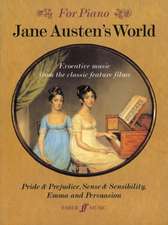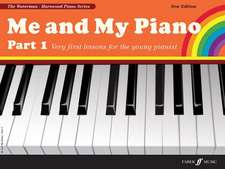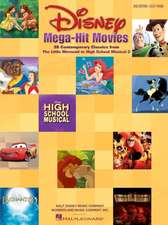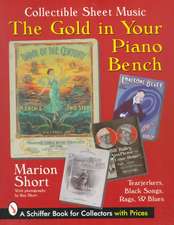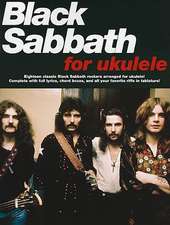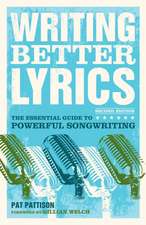Sources and the Circulation of Renaissance Music: A Library of Essays on Renaissance Music
Editat de Mary S. Lewisen Limba Engleză Paperback – 14 oct 2024
| Toate formatele și edițiile | Preț | Express |
|---|---|---|
| Paperback (1) | 228.97 lei 6-8 săpt. | |
| Taylor & Francis – 14 oct 2024 | 228.97 lei 6-8 săpt. | |
| Hardback (1) | 1196.25 lei 6-8 săpt. | |
| Taylor & Francis – 28 feb 2012 | 1196.25 lei 6-8 săpt. |
Preț: 228.97 lei
Preț vechi: 265.38 lei
-14% Nou
Puncte Express: 343
Preț estimativ în valută:
43.81€ • 45.74$ • 36.26£
43.81€ • 45.74$ • 36.26£
Carte tipărită la comandă
Livrare economică 05-19 aprilie
Preluare comenzi: 021 569.72.76
Specificații
ISBN-13: 9781032918365
ISBN-10: 1032918365
Pagini: 590
Dimensiuni: 174 x 246 mm
Greutate: 1.09 kg
Ediția:1
Editura: Taylor & Francis
Colecția Routledge
Seria A Library of Essays on Renaissance Music
Locul publicării:Oxford, United Kingdom
ISBN-10: 1032918365
Pagini: 590
Dimensiuni: 174 x 246 mm
Greutate: 1.09 kg
Ediția:1
Editura: Taylor & Francis
Colecția Routledge
Seria A Library of Essays on Renaissance Music
Locul publicării:Oxford, United Kingdom
Public țintă
AcademicCuprins
Contents: Introduction; Part I Scribes and the Making of Manuscripts: Manuscript structure in the Dufay era, Charles Hamm; Simon Mellet, scribe of Cambrai cathedral, Liane Curtis; A contemporary perception of early 15th-century style: Bologna Q15 as a document of scribal editorial initiative, Margaret Bent; The origins of the Chigi Codex: the date, provenance, and original ownership of Rome, Biblioteca Vaticana, Chigiana, C.VIII.234, Herbert Kellman; Jean Michel, Maistre Jhan and a chorus of beasts: old light on some Ferrarese music manuscripts, Joshua Rifkin. Part II Sources, Politics and Transmission: European politics and the distribution of music in the early 15th century, Reinhard Strohm; A gift of madrigals and chansons: the Winchester Part Books and the courtship of Elizabeth I by Erik XIV of Sweden, Kristine K. Forney; Danish diplomacy and the dedication of Giardino novo II (1606) to King James I, Susan G. Lewis [Hammond]. Part III Sources and the Transmission of Repertory: The early Tudor court, the provinces and the Eton Choirbook, Magnus Williamson; Antwerp's role in the reception and dissemination of the madrigal in the North, Kristine K. Forney. Part IV Patrons and Collectors: The purpose of the gift: for display or for performance?, Stanley Boorman; Music in the library of Johannes Klein, Tom R. Ward; Music for the nuns of Verona: a story about MS DCCLXI of the Biblioteca Capitolare in Verona, Howard Mayer Brown; The salon as marketplace in the 1550s: patrons and collectors of Lasso's secular music, Donna G. Cardamone. Part V Music Printing: 1501-1528: The 500th anniversary of the first music printing: a history of patronage and taste in the early years, Stanley Boorman; The printing contract for the Libro primo de musica de la salamandra (Rome 1526), Bonnie J. Blackburn. Part VI Printing and Printing Houses after 1528: The Libro Primo of Constanzo Festa, James Haar; Twins, cousins, and heirs: relationships among editions of music printed in 16th-cen
Notă biografică
Mary S. Lewis is Professor Emerita of Music, University of Pittsburgh, USA
Recenzii
’...like a well-curated museum exhibition, the whole is more than the sum of its parts. This volume provides valuable context: it places many of the field’s defining studies in dialogue with each other and allows readers to discover new or forgotten gems that have been tucked away in hard-to-access print copies of journals, Festschriften, and conference proceedings.’ Renaissance Quarterly
Descriere
This volume explores the means and motives for the distribution of music during the Renaissance. The selected essays discuss both the technical side of the production of sources as well as their roles in the society in which they were produced, and are accompanied by an introduction which places the essays within the wider history of Renaissance mu









